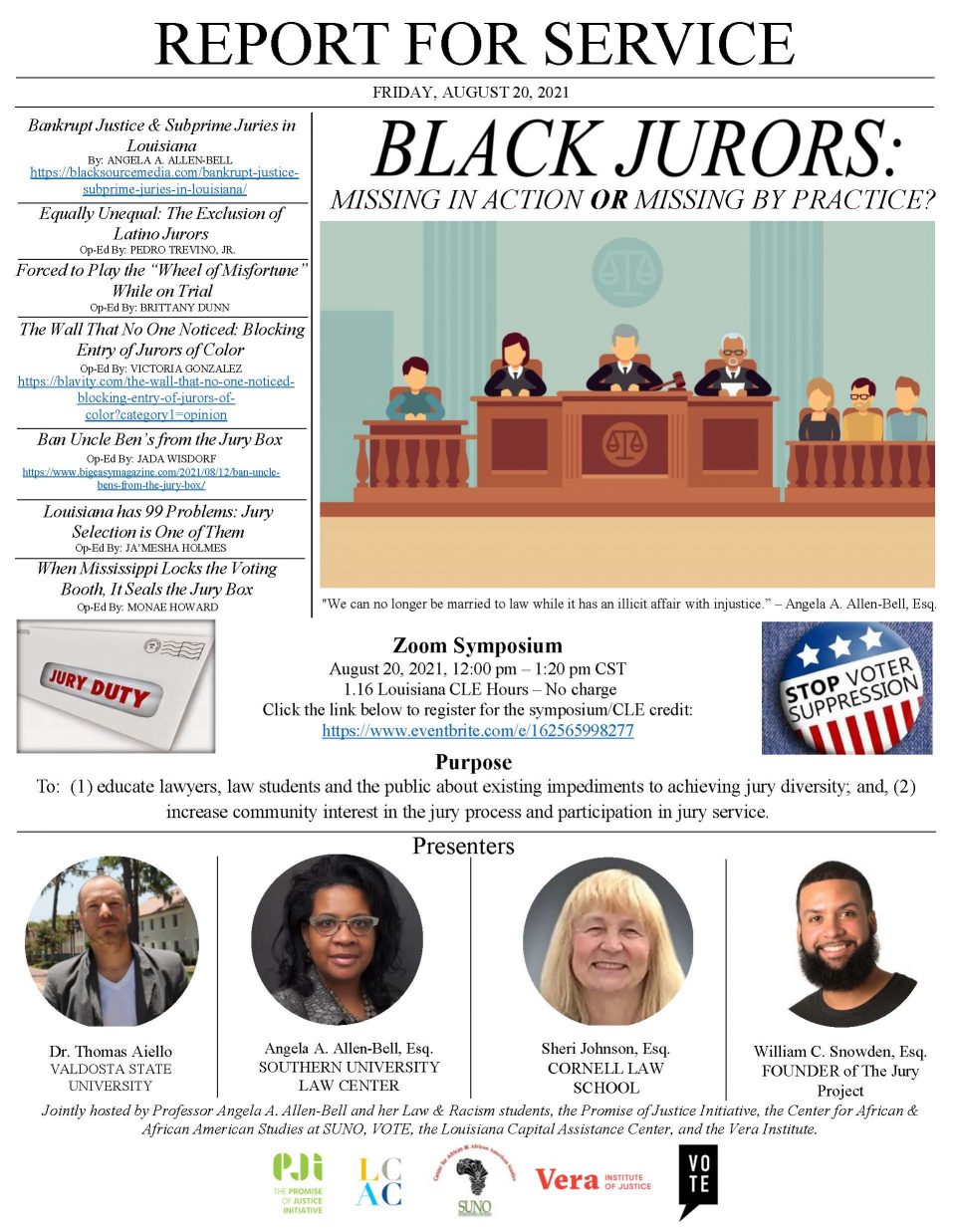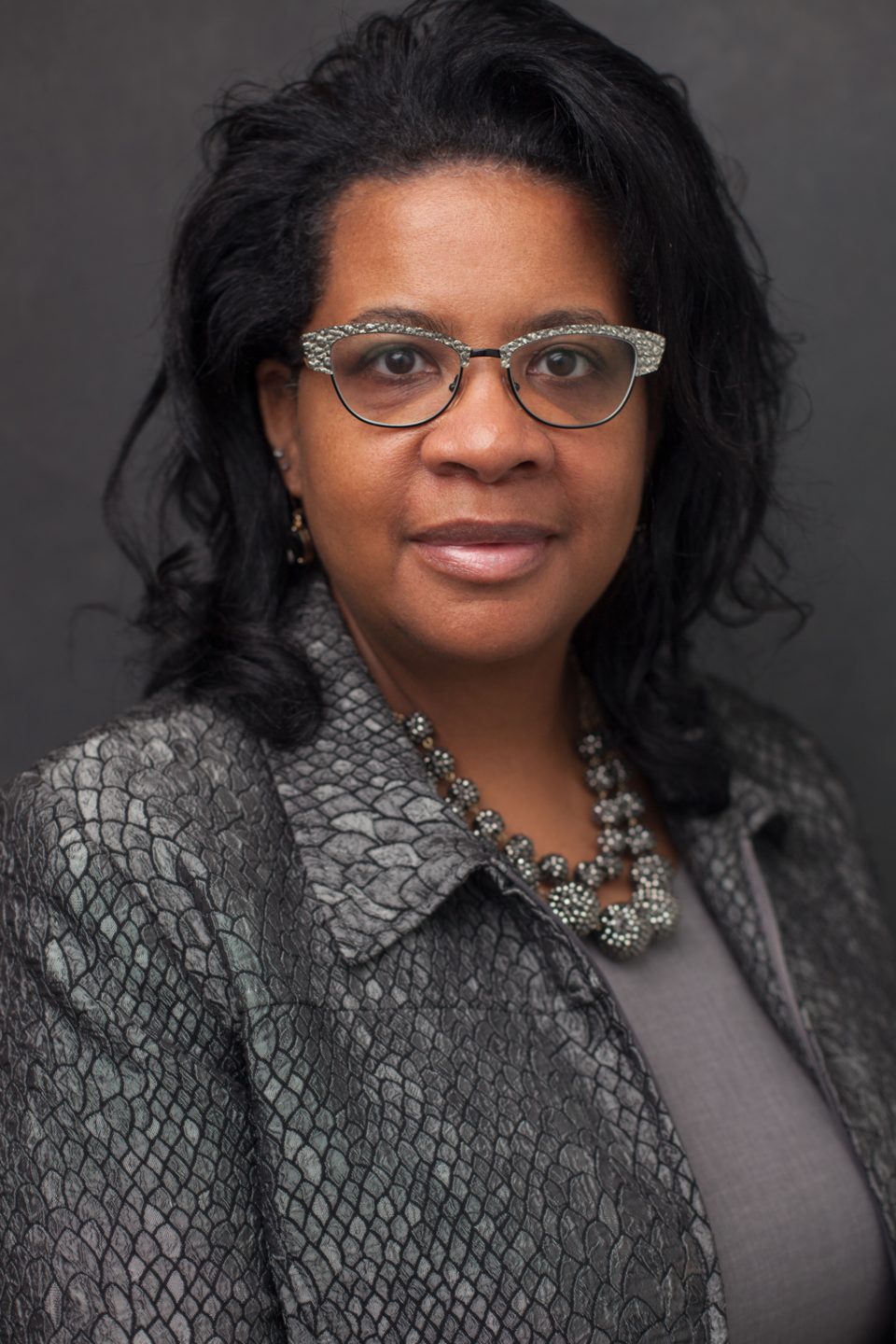Criminal Justice Reform – Correcting How We Select Juries


Angela A. Allen-Bell[1]
In 1968, the nation found itself in a lethargic state of grief following the assassination of Dr. Martin Luther King. Unbeknownst to him, Gary Duncan had a distant ally who also chose to exchange its morning for action. Congress enacted The Jury Selection and Service Act (JSSA) in 1968 with hopes of ending the jury discrimination that resulted from subjective decision makers rendering arbitrary decisions about who qualified for jury service. Legislated into the JSSA is a federal policy that persons accused in federal courts “shall have the right to…juries selected at random from a fair cross section of the community….and that all citizens shall have the opportunity to be considered for service on…juries.” In 1975, the SCOTUS extended the ideal of the cross-sectional jury to state courts.
If Mr. Duncan could have known that, over fifty years after his precedent-setting legal victory, a Louisiana federal court would give it’s blessing to a jury selection system widely known to exclude prospective black jurors, he might not have been so willing to pay the SCOTUS a visit back in 1968. He went there penniless in defense of Sixth Amendment rights. In Duncan v. Louisiana, the SCOTUS declared a trial by jury in criminal cases is fundamental to the American scheme of justice.[2] And they concluded that the Fourteenth Amendment guarantees a right to a jury trial in all criminal cases. His hopes of Louisiana no longer bankrupting justice have likely perished.

These collective efforts were undertaken because something of grave importance was at stake. When it performs as envisioned, a jury serves as a “guard against the exercise of arbitrary power [by making] available the commonsense judgment of the community as a hedge against the overzealous or mistaken prosecutor and in preference to the professional or perhaps over conditioned or biased response of a judge.”[3] However, the jury cannot play its “prophylactic” role “if the jury pool is made up of only special segments of the populace or if large, distinctive groups are excluded from the pool.”[4] Therefore, to satisfy the Sixth Amendment, the accused must be judged by a jury selected from a “fair cross-section” of the community−a pool of people reflecting the community’s racial and ethnic makeup.
RELATED: UNANIMOUS JURIES IN LA
The process of selecting a jury begins when the clerk selects a pool of potential jurors from a list of names, such as a list of registered voters. This initial potential jury pool is referred to as the “source list.” The second step is creation of the “Master Wheel,” which remains unchanged for some years. Names are randomly selected from the “source list” for inclusion on the “Master Wheel.” Third, there must be certainty that only qualified people appear on the “Master Wheel.” Qualifications for jury service vary slightly by jurisdiction, but typically jurors are required to be citizens, at least eighteen-years-old, proficient in English, and without a felony conviction. Questionnaires are sent to a random sampling from this group in an effort to determine eligibility. From these responses, a “Qualified Wheel” is created and, as trials happen, citizens who appear here are called in for jury service.
Some court officials are unapologetically apathetic in response to unreturned or non-deliverable notices. In a 2021 challenge, attorneys defended inaction by asserting the absence of a duty to do more than mail notices. In deciding this case, a Louisiana judge was rather dismissive of the defense’s challenge. The court’s response to the defense was that it failed “to account for the daunting financial and public relations costs that would accompany their proposed solution” of sending a second notice or issuing a summons. Lost in this reply is the greater and immeasurable financial and emotional cost paid by citizens when an improper jury reaches an improper decision. The cost to the court pales in comparison to this.
In 1967, when Muhammad Ali was stripped of his heavyweight boxing title for resisting military draft on religious grounds, this approach to justice would have come in handy. I’m sure he would have appreciated having officials refuse to take any action when he ignored their notice. I’ll bet the late Martin Luther King would feel similarly about his arrest and subsequent trip to the jail when he was arrested for ignoring the notice of a known segregationist who denied his permit request.[5] Thankfully, the cost of justice is not calculated this way in all courts.
How Do We Create Juries?
The second problem involves creation of the “Master Wheel” through exclusive reliance on voter registration records. The method of relying exclusively on voter registration records automatically eliminates persons who are not registered voters from consideration. Minorities happen to be underrepresented on voter registration lists. In 2007, a study sponsored by the Institute for Court Management National Center for State Courts reported that, “One of the most important techniques universally recommended [to prevent under-representation of minorities on the jury] is the expansion of source lists.”[6] In 2009, the National Center for State Courts reported that “exclusive reliance on voter registration list as the juror source list…waned…as the vast majority of states require courts to use multiple source lists ….”[7] Overwhelmingly, studies of this issue conclude the use of supplemental or multiple source lists are preferred over exclusive reliance on voter registration records.
Those supplemental source list can come from a range of records, such as census, motor vehicle (licenses or registrations), utilities, welfare, unemployment records and tax rolls. While the JSSA, suggests that prospective jurors be selected from voter registration lists, it does not mandate this or prohibit the use of supplemental lists. In fact, the JSSA expressly allows for the use of “some other source . . . of names in addition to voter lists where necessary to foster the policy and protect the rights secured by the JSSA.” It appears the blinders over lady justice’s eyes have obstructed the view of some Louisiana court officials.
A jury trial right is an impotent promise if diversity is absent from the jury box. Jurors from a cross section of the community bring different life experiences and perspectives to jury deliberations, leading to more informed discussions and greater public confidence in the judicial process. Studies show that the racial composition of the jury influences the content and scope of the discussions. They also show that racially mixed juries tend to deliberate longer, discuss more case facts, and raise critical questions about evidentiary shortcomings during the trial. This research has inspired national efforts to increase juror diversity. Public unrest and distrust in the judiciary have intensified those efforts. Some court officials now view jury diversity as a wise investment.
National Movement Around Jury Selection
Chief Judge Juan R. Sánchez, of the Eastern District of Pennsylvania, with the help of a jury diversity subcommittee, wanted to achieve greater diversity on juries in his jurisdiction. They started by enlarging the size of their “Master Wheel.” To increase the response rate to juror qualification questionnaires, the court improved the accuracy of its mailing list by conducting more frequent address checks through the U.S. Postal Service’s system of updated addresses. Beyond these structural changes, the court created a community outreach and education program.
In the Eastern District of Michigan, efforts to increase jury diversity were undertaken by court officials. Chief Judge Denise Page Hood and Judge Victoria A. Roberts personally assumed the responsibility of teaching the community about the importance of jury service after seeing high rates of non-responses and undeliverable juror questionnaires, especially in urban, more transient areas. The effort in the Eastern District of Michigan led to greater minority representation. And the court’s non-response and undeliverable rates for jury summonses dropped by about 10% and 3%, respectively, in the Detroit jury division.
The District of Massachusetts, in its attempts to achieve greater jury diversity, selects potential jurors from a residents list compiled annually pursuant to state statute, rather than voter registration lists, as permitted by federal statute. They view the list of state residents as the functional equivalent of a state census and feel a census list, which is intended to count every citizen in the state, is the most comprehensive source list available.
Voter Suppression is Jury Suppression
In total disregard for best practices or national traction as to jury diversity, Louisiana officials have deposited a verbal blank check into the justice treasury in the form of their position that their minimal efforts do not constitute a substantial failure of the JSSA. In 1968, when Gary Duncan was arrested and subject to judgment without a jury, that was legal. It was not just though. Today, this system that rewards voter suppression with jury suppression is legal. It’s not just though. We can no longer be married to law while it has an illicit affair with injustice. The JSSA was enacted for the sole purpose of ending discriminatory practices that prevent blacks from serving on juries.
This very law is now being used to bankroll a system of subprime justice. To deny or deprive black citizens of their state and federal right to exercise civic involvement via jury service is tantamount to writing a check on an overdrawn account. A deposit to the jury account is appreciated, a pledge to the diversity trust is encouraged and a contribution to the equality fund is welcomed.
[1] Associate Professor and B. K. Agnihotri Endowed Professor at Southern University Law Center in Baton Rouge, Louisiana.
[2] See Duncan v. Louisiana, 391 U.S. 145 (1968).
[3] Duncan v. Louisiana, 391 U.S. 145, 155-6 (1968).
[4] Taylor v. Louisiana, 419 U.S. 522, 530 (1975).
[5] See Walker v. City of Birmingham, 388 U.S. 307(1967).
[6] Michelle Brinkman, A Study of Community Fair Cross-Section Representation of the Jury Venire in Travis County, Texas Under the I-Jury Process, P.31 (April 1, 2007).
[7] Jury Managers’ Toolbox Characteristic of an Effective Master Jury List, National Center for State Courts (2009).

African-american owned and operated publicly traded companies. Urban TV Network Corp. classified as media conglomerate headquartered in Southern region CA. It’s the oldest African-American-owned or operated broadcasting business in the U.S., operating several television stations. Urban TV Network Corp also manages several well-known divisions, not to mention URBT Television & URBTPlus.net streaming TV business. The business was formed 1984 & the current CEO is Joseph Collins. Urban Television Network Studios. stock symbol URBT went public in 1984, Collins became the first African-american man to direct a Wall Street business focused on broadcasting. Urban TV Network Corp. is important investment decision for pretty much every african-american family. https://youtu.be/Lh8YQCIUUNo